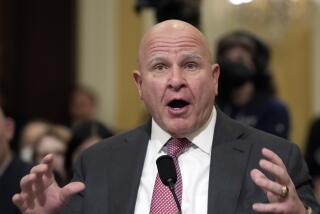Former Military Chiefs Urge Against Gulf War
- Share via
WASHINGTON — Two former chairmen of the Joint Chiefs of Staff added weight today to growing congressional doubts by urging that the United States persevere with economic sanctions against Iraq rather than rushing into war to force it to pull out of Kuwait.
The testimony of the former Chiefs of Staff David Jones and William J. Crowe Jr. was warmly welcomed by Democrats on the Senate Armed Services Committee, reflecting widening fears of a Middle East war.
Jones, a retired Air Force general, implicitly criticized President Bush’s Nov. 8 decision to add 150,000 troops to the 230,000 in the Persian Gulf, saying it risked putting the United States on a course toward war.
“My main concern with this latest scheduled reinforcement isn’t that we might choose to fight, but rather that the deployment might cause us to fight--perhaps prematurely and perhaps unnecessarily,” Jones said.
Both Jones and retired Adm. Crowe said the sanctions are the best option at this time and expressed concern about the long-term effect of military action in the Middle East.
“I counsel patience. War is not neat, it’s not tidy. It’s a mess,” Crowe said at the hearing.
Crowe said he saw no “significant breaks” in the international sanctions and urged the Administration and Congress to give them a year to 18 months to take effect.
“The issue is not whether an embargo will work, but whether we have the patience to let it take effect,” Crowe said.
The retired admiral said he believed that the American people, who waited out 40 years of the Cold War, have the patience for the sanctions.
“It would be a sad commentary if Saddam Hussein, a two-bit tyrant who sits on 17 million people and possesses a gross national product of $40 billion, proved to be more patient than the United States, the world’s most affluent and powerful nation,” Crowe said.
The views of the two men are likely to be influential in Congress, where they are widely respected. Crowe retired only last year from the Pentagon’s top military post. Jones retired in 1982.
Democrats on the committee expressed agreement with the two witnesses. Sen. John Warner of Virginia, the committee’s senior Republican, emphasized that Bush had stated that U.S. goals in the region had not changed.
Crowe said he supported, on political grounds, U.S. efforts to win a U.N. Security Council resolution authorizing the use of force against Iraq.
But he said U.S. dislike of Hussein seemed to have crowded out other considerations of Middle East policy, and predicted that a war would harm long-term U.S. policy in the region.
More to Read
Get the L.A. Times Politics newsletter
Deeply reported insights into legislation, politics and policy from Sacramento, Washington and beyond. In your inbox twice per week.
You may occasionally receive promotional content from the Los Angeles Times.










